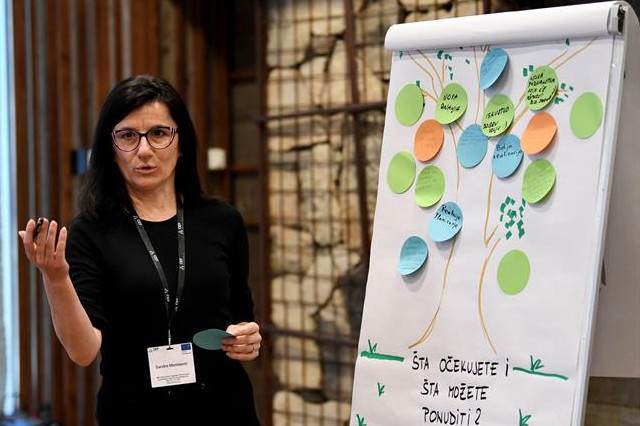Advancing Learning and Knowledge Exchange for Effective Structural Reforms
When I think about learning and knowledge, the phrase "sharing is caring" immediately comes to mind. While it may sound like a cliché or an influencer catchphrase, it holds a profound truth: sharing knowledge is one of the greatest acts of care. Knowledge is a uniquely human resource - rich in depth, complexity, and limitless potential - even when augmented or generated by artificial intelligence.
Ivo Andrić, the Nobel Prize-winning genius from Travnik, begins his tale - a heartfelt confession about a library book borrowed but never returned - with the poignant opening lines of an old Bosnian poem: “Moj mejtefu, moj veliki strahu, dosta ti sam straha podnijela, dok sam sitnu knjigu naučila” [My school, my great fear, I have endured much fear from you while learning even a little book]. These verses highlight fear as humanity’s greatest obstacle to personal growth. A fear that only intensifies as the subject of learning grows more complicated.
Designing structural reforms is among the most challenging aspects of managing a country’s economy. Effective reforms are built on a deep understanding of economic and social dynamics, require innovative thinking, visionary decision-makers, resources, time, and patience, as change does not happen instantly. Above all, they require continuous learning to adapt to an ever-evolving environment. Just as language is often described as a living entity, the same applies to strategic documents, particularly those shaped by the European integration process, such as the Economic Reform Program (ERP) and the Reform Agenda (RA). Throughout the years, we have learned that the preparation of the ERP (as well as the RA) is not merely a technical exercise but a dynamic and iterative learning process. It provides governments with a crucial opportunity to enhance their understanding of the economy, refine policymaking, and build institutional capacity in line with the demands of the European integration process.
Institutional learning is essential for ensuring the effective implementation, monitoring, and evaluation of planned reforms. The central part of this exercise are people. The Center for Excellence in Finance (CEF) recognizes the importance of people in the structural reform process and has been working for years with officials from the Western Balkans and Türkiye to build knowledge in this field. As a result, a national network of experts was established, whose members gathered in Ljubljana in November 2024 for the workshop “Fostering Learning and Knowledge Exchange on Structural Reforms”.

We were also introduced to a knowledge product, a practical tool designed to analyze the quality of ERP content. Its practical application was demonstrated through an analysis of Albania's ERP, focusing on labor market reforms. This exercise served as a practical test of our understanding of reform methodologies, selecting indicators, summarizing information, and identifying essential skills - key steps in creating strategic documents that are both high-quality and actionable.
Mr. Jaša Levstik, a colleague at least 15 years my junior and the moderator of the workshop, taught me valuable lessons about public speaking and presentation skills. His effortless expression, subtle yet commanding presence, confident stagecraft, and skillful guidance of discussions truly impressed me. When it comes to learning, age holds no significance.
The workshop also brought us closer as a group. We exchanged views on morality, values, and what makes each of us unique. We reflected on what connects us, often finding history as the common thread. We joked with our Turkish colleagues about contributing at least one sultan and several sultanas to their history. Amid these lighthearted moments, we discovered surprising connections, such as four group members sharing the same birthday. An Albanian colleague from the Ministry of Finance calculated the odds of such a coincidence as 1 in 80 billion. Whether accurate or not, it was a delightful reminder of how connected we all are.
When new requirements are introduced and deadlines are tight, sharing experiences and knowledge among colleagues in the region becomes a kind of analgesic that alleviates the consequences of the burden of rapid adaptation. It's good to be part of the National Regional Expert Group, indeed.
What left the deepest impression on me, however, were my colleagues from Ukraine. Hearing their stories was profoundly moving. They traveled from Kyiv to Warsaw by train, then flew to Brussels, and finally to Ljubljana - all to share their expertise on structural reforms in a country at war. In their presentations, they often spoke of life and work before the war. As I listened, I felt a deep sense of empathy, knowing their lives will forever be divided into “before” and “after.” I understand this feeling from personal experience, and it is so heartbreaking.
As I mentioned earlier, the workshop was held in Ljubljana - a city that feels truly special. It’s like a princess from a fairy tale, one with a happy ending. Walking through its streets, you can sense the spirit of Cankar’s youth, marked by nostalgic poverty and the awakening of Slavic pride and identity. In the main square, Prešeren still stands, forever trying to win over his Julia. He doesn’t give up - poets never do. And I won’t give up on Ljubljana either. It’s my city, my place. After all, it was in this city, along the banks of the Ljubljanica, that I felt the most loved.
